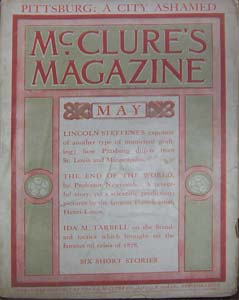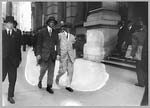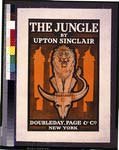1905 – Appeal to Reason runs part of Upton Sinclair’s series on working conditions at meatpacking plants in Chicago .
Shortly after Tarbell’s work on Standard Oil began appearing in McClure’s, another, lesser-known publication began printing the work of another writer that detailed the problems of another industry. But Upton Sinclair’s expose of the meatpacking industry in Socialist newspaper Appeal to Reason had arguably as much of an impact on society and business as Tarbell’s writing.


Sinclair was born in Baltimore in 1878 and moved to New York 10 years later. His writing career had been undistinguished until the owner of Appeal to Reason gave him $500 and commissioned him to write about the immigrant workers in the Chicago meatpacking plants. Sinclair spent nearly two months observing the working and living conditions of the employees in the plants, and the newspaper serialized his account in 1905. Interestingly, the newspaper dropped the novel after only about two-thirds of it had been published.
Publisher Macmillan, which had earlier published Sinclair’s Manassas , wanted to sell the book, however, and Sinclair sent the manuscript of The Jungle to them. After initially agreeing to a contract, the publisher withdrew its offer. Some speculate that the publisher was pressured by the industry to avoid the book. However, Sinclair found another publisher, Doubleday Page, which published a sanitized version in 1906 although it had been threatened with a libel lawsuit from meatpacker Armour & Co.

The book, although a fictional tale about immigrant Jurgis Rudkos, was an immediate hit because of its realistic portrayal of life in Packingtown, as the area around Chicago where the meat plants operated was called. Workers suffered miserable conditions and worked in unbearable heat and cold. Others suffered injuries on the job that led to their death. Still others lost their jobs at the whim of their boss.
Sinclair had set out to write a book that would advance the Socialist movement in America by criticizing how working people were being treated. Instead, as he aptly noted later in his career, his writing hit the American public in the stomach. The descriptions of the unsanitary conditions in the plants led to an uproar over healthy meat. Spoiled meat was routinely packed and sold to consumers. Rats that ran through the plants were processed along with cows. Inspectors were bribed to turn the other way.
President Roosevelt sent a scathing letter to F. N. Doubleday criticizing the book, noting that an Agriculture Department report had described meatpacking as safe. Doubleday responded that Sinclair’s depictions in the book were an accurate portrayal, and Roosevelt launched an investigation.